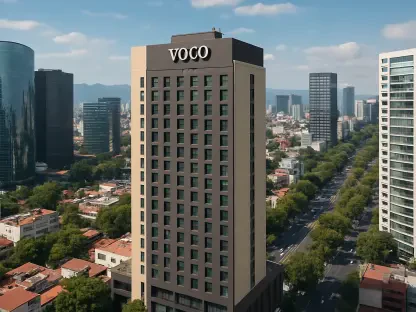The event and venue management industry is experiencing a remarkable evolution, influenced by technological advancements and shifting attendee expectations. Current trends are poised to redefine how events are envisioned, orchestrated, and enjoyed, paving the way for a dynamic and innovative landscape.
Seamless Technology and Digital Automation
Rising Importance of Seamless Technology
Modern technology has evolved to support the complex aspirations of event planners and venues. However, many establishments continue to depend on labor-intensive manual processes that hinder efficiency and growth. In response, the current era emphasizes the integration of seamless technology across various stages of event management. From check-in procedures to interactions between attendees and exhibitors, contactless solutions are becoming indispensable. Such technology allows for smoother and more efficient experiences, setting a new standard for operational excellence. As venues adapt to this trend, the focus on seamless technology aims to replace outdated manual tasks, ensuring streamlined operations and higher levels of efficiency.
The Role of Digital Automation
An overwhelming majority of large-scale events now leverage digital automation tools, reaping the benefits of heightened efficiency and improved outcomes. Digital automation can cover a range of activities, including scheduling, invoicing, resource allocation, and vendor management. The growing preference for seamless attendee experiences and safety protocols has notably accelerated the adoption of contactless technologies. Despite these advancements, the technological landscape within the industry remains somewhat fragmented. Reports indicate that many event teams manage multiple tech solutions, yet a unified and fully integrated system is still uncommon. This scenario underscores the necessity of consolidating technology to optimize workflows and maximize the benefits of digital automation. Advanced, cohesive platforms not only enhance staff productivity but also improve client relations and enable the creation of scalable, memorable events.
Artificial Intelligence (AI) in Events
Elevation of Attendee Experiences with AI
Artificial Intelligence (AI) is transforming the way events are managed, with significant implications for the hospitality industry. AI’s capacity to provide personalized engagement has already made notable strides, enhancing attendee satisfaction. Data shows that a significant portion of event organizers utilize AI to create tailored experiences, resulting in higher satisfaction rates among attendees. Additionally, AI is employed for tasks that streamline event operations, such as registration and interaction management. As AI tools continue to evolve, their potential to elevate the attendee experience becomes increasingly evident. The rise of AI marks a shift toward a more customized and efficient approach to event planning.
Widespread AI Applications
The impact of AI in event management extends far beyond personalized engagement. AI applications are becoming more widespread, offering features like real-time translations, customized networking events, and personalized touchpoints, such as bespoke attendee swag bags. These features ensure that each attendee’s journey is unique and engaging. Furthermore, AI tools provide invaluable insights into attendee preferences and behaviors, offering real-time data that can be used to refine and improve event experiences. This ability to gather and analyze feedback is crucial for the continued success of events, allowing organizers to adapt and enhance their offerings based on concrete data.
Unified Event Platforms
Addressing Platform Fatigue
The hospitality sector has long grappled with the challenge of managing numerous disparate systems, leading to what is known as “platform fatigue.” This phenomenon arises from the over-reliance on multiple, often uncoordinated, technology systems, which result in an inundation of non-actionable or poorly structured data. Employees across various industries report feeling overwhelmed by navigating an average of ten different apps and tools daily. This inefficiency not only hampers productivity but also complicates the management of key event details. As the industry evolves, there is a pronounced need to consolidate these systems into more coherent, unified platforms.
The Push for Fully Integrated Systems
In recent years, the movement towards fully integrated and customizable sales and catering platforms has gained momentum. This approach aims to streamline the entire event lifecycle by providing a singular, cohesive view of all processes involved. IT organizations are progressively reducing the number of separate platforms they use, aiming for a more unified data ecosystem that enhances operational efficiency. With a focus on customizable yet fully integrated solutions, venues can effectively manage every aspect of an event from a single platform. This shift not only simplifies the management process but also ensures that data collected is actionable and useful.
Interactive Technology and Gamification
Enhancing Engagement through Interactivity
The traditional format of conferences, characterized by passive participation, is being replaced by more engaging and interactive experiences. Advances in technology, particularly in virtual reality (VR) and augmented reality (AR), enable event organizers to create immersive environments that captivate attendees. These technologies can transform standard sessions into dynamic experiences, making events more memorable and impactful. Event organizers now have the tools to craft unique, interactive platforms where attendees can actively engage with the content. The move toward interactive technology signifies a departure from the passive consumption of information, fostering greater participation and engagement.
The Impact of Gamification
Gamification has emerged as a powerful tool to boost attendee engagement and overall satisfaction. By incorporating elements of games and challenges into event experiences, organizers can incentivize participation and create more dynamic interactions. Gamification techniques, such as rewards and unique experiences for participants, can increase engagement levels by up to 60%, while overall satisfaction can rise by 50%. These elements not only make events more enjoyable but also encourage attendees to interact and network more effectively. Through the strategic use of interactive technology and gamification, events can become more immersive, fostering a deeper connection between attendees and the event content.
Unique Venues and Eco-Conscious Events
Demand for Unique and Memorable Venues
As business travel continues to be a major driver for the hospitality industry, the demand for unique and memorable venues is rising. Event planners are increasingly seeking non-traditional venues that offer distinctive experiences, reflecting the evolving preferences of attendees. Venues such as museums, galleries, and rooftop spaces are becoming popular choices for hosting events. This shift away from conventional venues caters to a desire for novelty and can enhance the overall appeal of an event. These unique sites not only provide engaging backdrops but also contribute to creating memorable and impactful experiences for attendees, elevating the overall event atmosphere.
Embracing Sustainability
The event and venue management industry is undergoing a significant transformation, driven by advancements in technology and changing attendee expectations. These changes are not just surface-level but are set to deeply influence how events are conceptualized, executed, and experienced. For instance, the incorporation of digital tools such as virtual reality, AI, and mobile apps is becoming more prevalent, offering new ways to engage attendees and streamline operations. Additionally, there is a growing emphasis on personalized experiences, sustainability, and hybrid events that combine in-person and virtual elements. This shift is setting the stage for an exciting and innovative future, where event planners and venue managers will need to adapt to these evolving trends to stay relevant. Key players in the industry are continuously exploring new approaches to create memorable and impactful experiences for their audiences. As the landscape continues to evolve, the importance of flexibility, creativity, and technological integration cannot be overstated.









